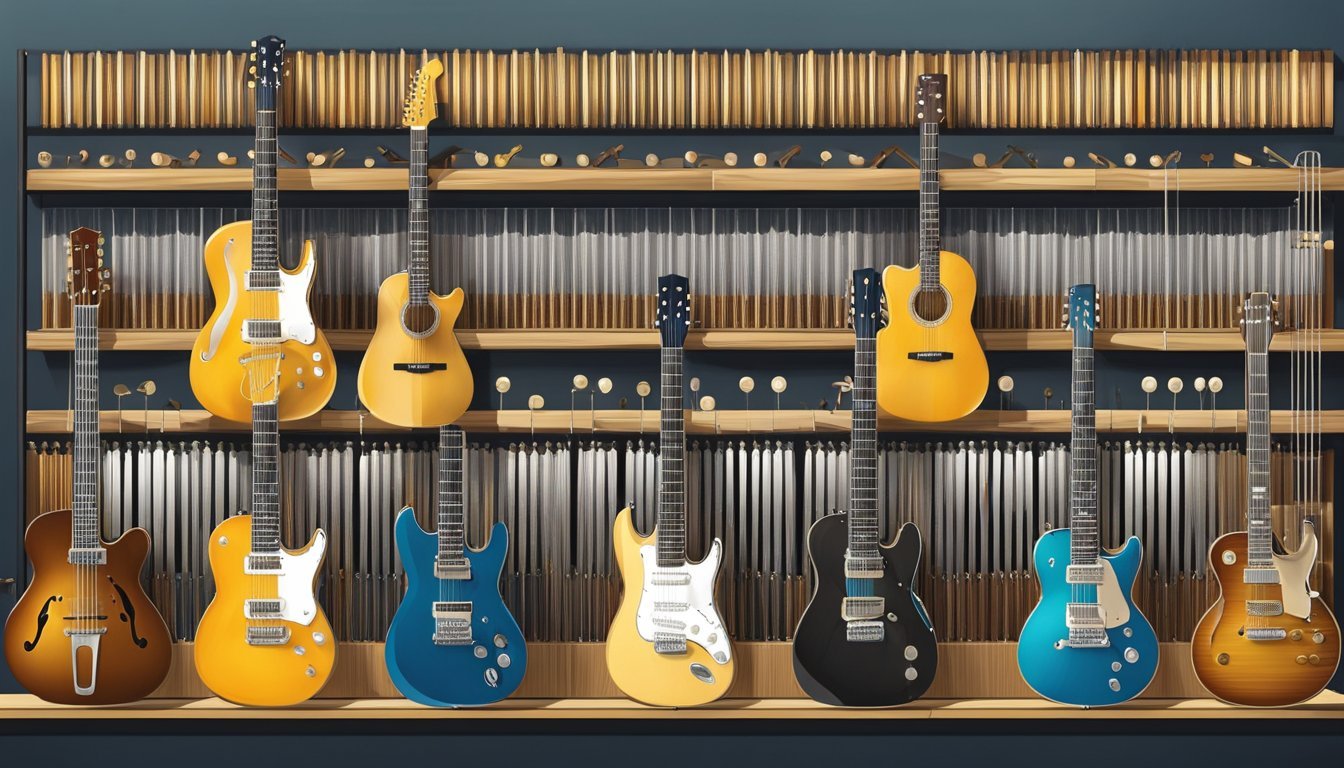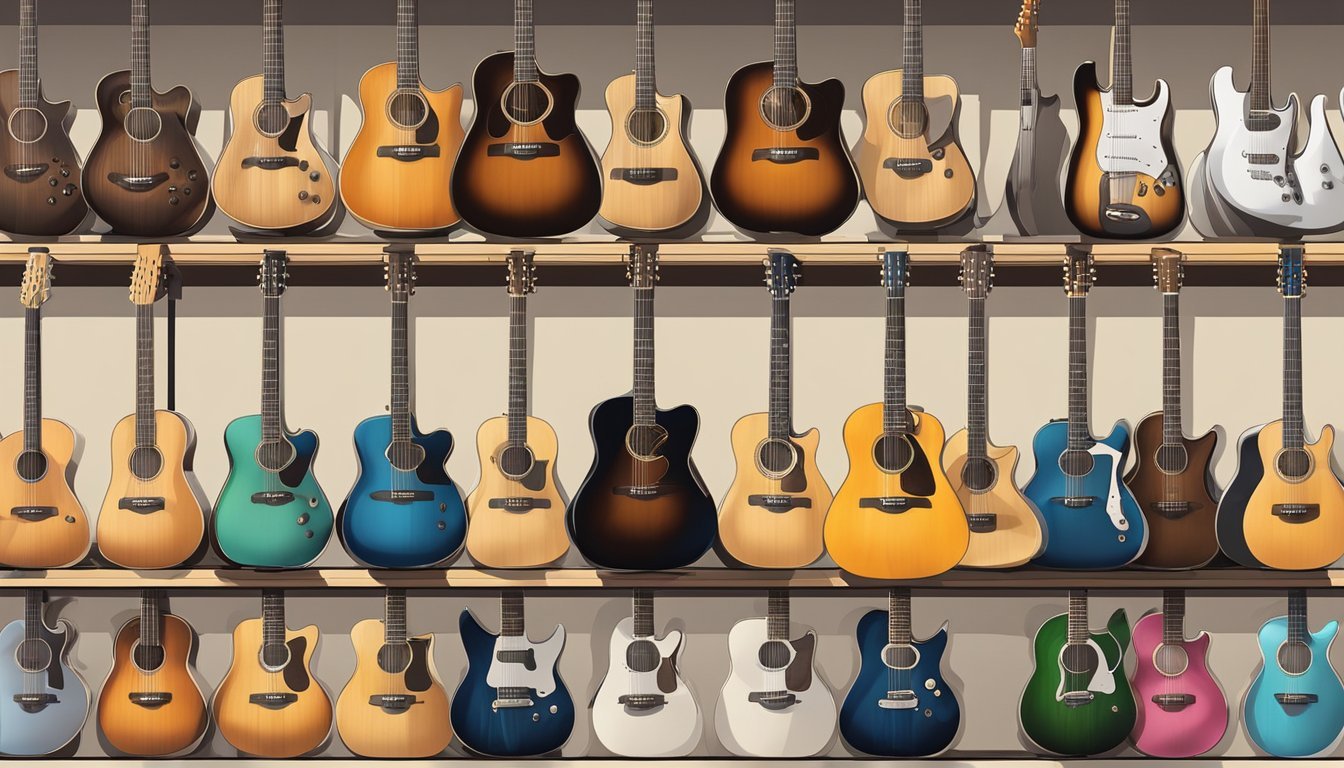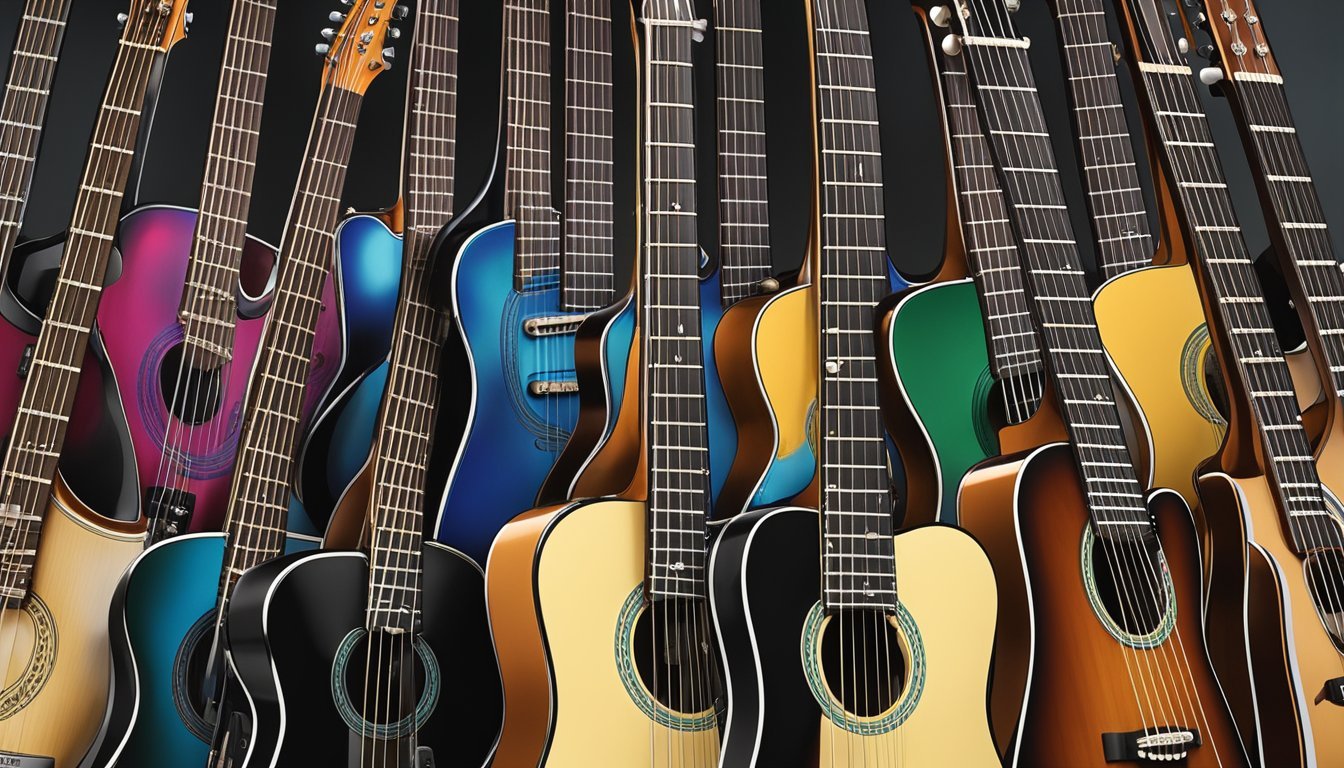Finding the right guitar strings can feel overwhelming with so many options available.
You can buy guitar strings from local music stores, online retailers, or specialty websites that focus on guitar accessories.
Whether you’re a beginner or a seasoned player, knowing where to shop can save you time and ensure you get the strings that suit your style.

Understanding the different types of guitar strings and their brands is key to making the best choice for your instrument.
You’ll discover various materials, gauges, and brands that provide unique sounds and playability.
With the right information, you can find the perfect set of strings to enhance your playing experience.
Key Takeaways
- Local stores and online shops offer a variety of guitar strings.
- Different string types suit different playing styles.
- Popular brands provide diverse options for every musician.
Understanding Guitar String Types

Choosing guitar strings can seem tricky, but knowing about their types makes it easier.
You need to consider the differences between acoustic and electric strings, along with the materials used.
This can help you find the best fit for your playing style.
Acoustic vs. Electric: Core Differences
When comparing acoustic and electric guitar strings, the first thing you notice is their core.
Acoustic guitar strings are usually made with a round core for a warmer sound.
These strings often use materials like phosphor bronze, which gives a rich, full tone.
On the flip side, electric guitar strings typically have a hexagonal core.
This design allows for better tension and more sustain.
Many electric strings are nickel wound, which produces a brighter and sharper sound.
Consider these points:
- Tone: Acoustic strings offer warmth, while electric strings give clarity.
- Playability: Electric strings can feel lighter and easier to bend.
Choosing the right type matters a lot for your music style and instrument.
Material Matters: Phosphor Bronze and Nickel Wound
The material of your guitar strings significantly affects your sound.
Phosphor bronze strings are known for their brilliant tone, making them a favorite among acoustic players.
These strings are made from copper and tin, providing great resonance.
They retain sound quality for a long time, but may tarnish quicker than other materials.
On the other hand, nickel wound electric guitar strings use a blend of nickel and steel.
This combination offers a balanced tone that works well with pickups.
Nickel wound strings tend to last longer and are less prone to corrosion, making them a top choice for many electric players.
Key features to remember:
- Phosphor Bronze: Warm, full tone; ideal for acoustic guitars.
- Nickel Wound: Bright, clear sound; great for electric guitars.
Selecting the right material impacts your tone and playing experience.
Top Brands and What They Offer

When it comes to guitar strings, a few brands stand out for their quality and variety.
Each of these brands offers something unique to cater to different playing styles and preferences.
Here’s what you need to know about some of the top choices available.
D’Addario’s Range
D’Addario is a go-to brand for many guitarists.
They offer a wide selection of strings, including options for acoustic and electric guitars.
One of their popular choices is the XL Nickel Wound series, which gives you a bright tone and clear sound.
These strings are known for their durability and feel.
If you’re into unique sounds, the Observation & Blues set provides great warmth, which is popular among blues players.
D’Addario also has Phosphor Bronze strings that lend a rich tone to acoustic guitars.
You can find their various gauges, from light to heavy, making it easy to find the right fit for your style.
Ernie Ball’s Signature Slinky Series
Ernie Ball is famous for its Slinky series, particularly the Power Slinky Electric Guitar Strings.
These strings have a thicker gauge, which can give you a fuller sound.
If you enjoy a heavier feel, the Power Slinky (.011 – .048) can be perfect.
They are great for rock and blues because they balance a bright tone with solid feedback.
Ernie Ball also offers Regular Slinky strings if you prefer something lighter.
You’ll appreciate how easy they are to play, making them ideal for soloing.
Plus, with their innovative packaging, these strings stay fresh and protected until you’re ready to use them.
DR’s Handmade Strings
DR Strings takes pride in their handmade products.
Their strings are crafted with care, providing excellent sound quality.
The Dragon Skin series has a coated finish designed to resist dirt and grime, extending the life of your strings.
These are perfect if you play frequently and want to avoid frequent replacements.
Another popular choice is the Hi-Beam series, which offers a bright, resonant tone due to its round core construction.
Whether you’re into blues, rock, or jazz, DR has options to last you through every gig.
Martin’s String Selection
Martin is known for its acoustic guitars, but their strings are just as impressive.
They offer a variety of options that appeal to different playing styles.
The SP Lifespan strings are treated for durability and longevity.
They produce a warm, balanced tone that suits many genres.
If you prefer traditional strings, check out the Martin Authentic Acoustic series.
These provide a rich sound that enhances the natural tonal qualities of your guitar. Martin strings are made with high-quality materials, making them a solid choice for any acoustic player looking to enhance their sound.
Where to Shop for Guitar Strings
When you need guitar strings, finding the right place to shop is key.
You can go to local music stores for personalized service or check out online marketplaces for a wide selection.
Additionally, consider exploring specialty websites dedicated to guitar accessories to discover exclusive brands and deals.
Remember that the best choice often depends on your specific needs, such as string type and gauge.
If you’re uncertain about where to buy guitar strings, seeking recommendations from fellow musicians can also lead you to trusted sources.
Local Music Stores
Shopping at a local music store offers a personal touch.
You can talk to staff who are often musicians themselves.
They can help you find exactly what you need.
Most stores stock popular brands like D’Addario and Ernie Ball. Pricing can vary, but you may find deals on bulk purchases.
Many local stores also provide a chance to try out different strings before buying.
This can be especially helpful if you’re unsure about gauge or material.
Don’t forget to check if they have special promotions or loyalty programs.
Building a relationship with your local shop can pay off in future discounts or recommendations.
Online Marketplaces
Online shopping provides convenience and variety.
Websites like Strings and Beyond offer a vast selection of guitar strings.
You can filter by brand, type, and gauge to find what fits your needs.
Many online stores also provide bulk options.
If you go through JustStrings, you can buy sets at lower prices.
Shipping costs are often waived for orders over a certain amount.
For instance, Strings and Beyond offers free shipping on orders over $35.
Plus, online reviews give you insights into string performance.
Just make sure to check the return policies to feel secure in your purchase.
Choosing Strings Based on Playing Style
Selecting the right guitar strings can really improve your sound.
It’s all about matching the strings to your playing style.
Acoustic Players: If you play acoustic guitar, consider using bronze or phosphor bronze strings.
They offer a bright sound that works well for fingerpicking or strumming.
Coated Strings: For longer-lasting strings, look into coated strings.
They resist dirt and grime, making them perfect if you prefer a clean tone and less maintenance.
Electric Guitarists: If you play electric guitar, think about the gauge.
Lighter strings are easier to bend and are great for lead playing, while heavier strings give you more volume and stability for rhythm playing.
Guitar Picks: Your choice of pick can also affect your sound.
Thicker picks provide a stronger attack, which is great for strumming, while thinner picks allow for a softer touch, suitable for more delicate playing styles.
Here’s a quick guide to help you choose:
| Playing Style | String Type |
|---|---|
| Fingerstyle Acoustic | Bronze or Phosphor Bronze |
| Strumming Acoustic | 80/20 Bronze |
| Lead Electric | Light Gauge |
| Rhythm Electric | Heavy Gauge |
Frequently Asked Questions
You might have some questions about finding the right guitar strings, pricing, and where to buy them.
Let’s go through some common queries you may have.
How do I figure out which guitar strings are right for my guitar?
To choose the right strings, consider your guitar type, style of play, and personal preference.
Acoustic guitars commonly use bronze or silk and steel strings.
Electric guitars often use nickel or steel strings.
You can also check the gauge, which affects how the strings feel and sound.
What’s a good price range for quality guitar strings?
Quality guitar strings usually range from $5 to $20 per set.
Budget-friendly options are available, but investing a bit more can often give you better tone and durability.
Keep an eye out for sales or bundles to save money on multiple sets.
Can you suggest some trusted places to buy guitar strings online?
You can buy guitar strings from popular online retailers like Amazon, Guitar Center, and Sweetwater.
Websites like Guitar Center offer a wide selection along with customer reviews, helping you make informed choices.
Is it worth buying guitar strings in bulk, and where can I do that?
Buying in bulk can save you money if you change strings often.
Many retailers provide discounts for bulk purchases.
Consider checking sites like Sweetwater or local music stores that offer loyalty programs for regular customers.
Are there any differences when choosing strings for electric vs. acoustic guitars?
Yes, there are key differences.
Acoustic strings are generally thicker and made of materials like bronze and brass.
Electric strings are usually thinner and made from nickel or steel, designed for different tonal qualities and playability.
How often should I replace my guitar strings?
The frequency of string changes depends on how often you play.
If you play daily, consider changing them every 1 to 2 weeks.
If you play less frequently, changing them every month should be fine.
Always trust your ears—if they sound dull, it’s time for a change!

